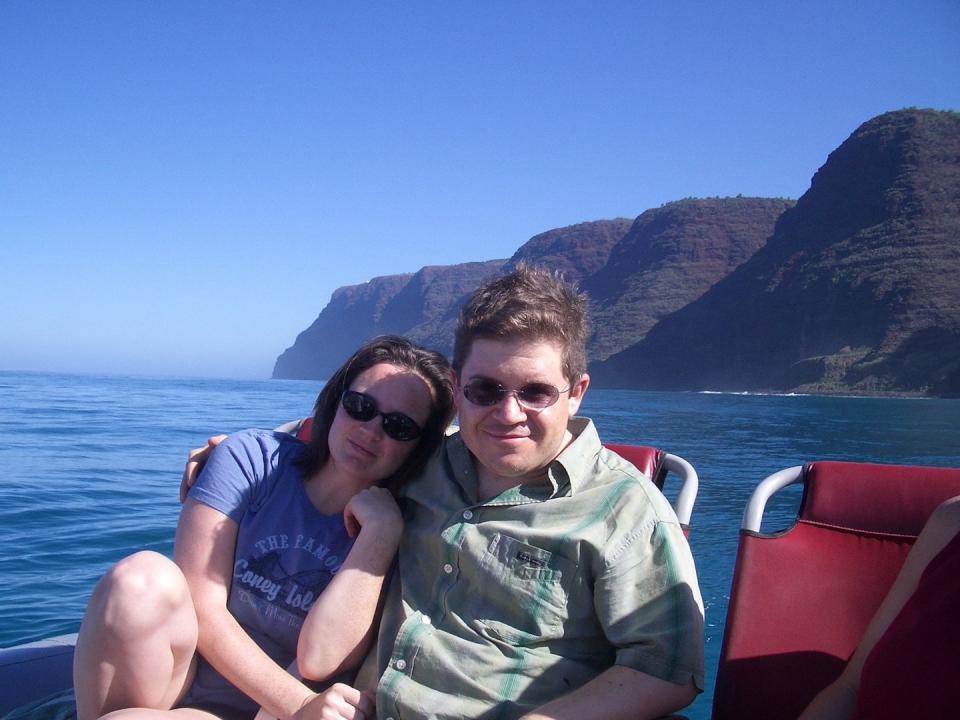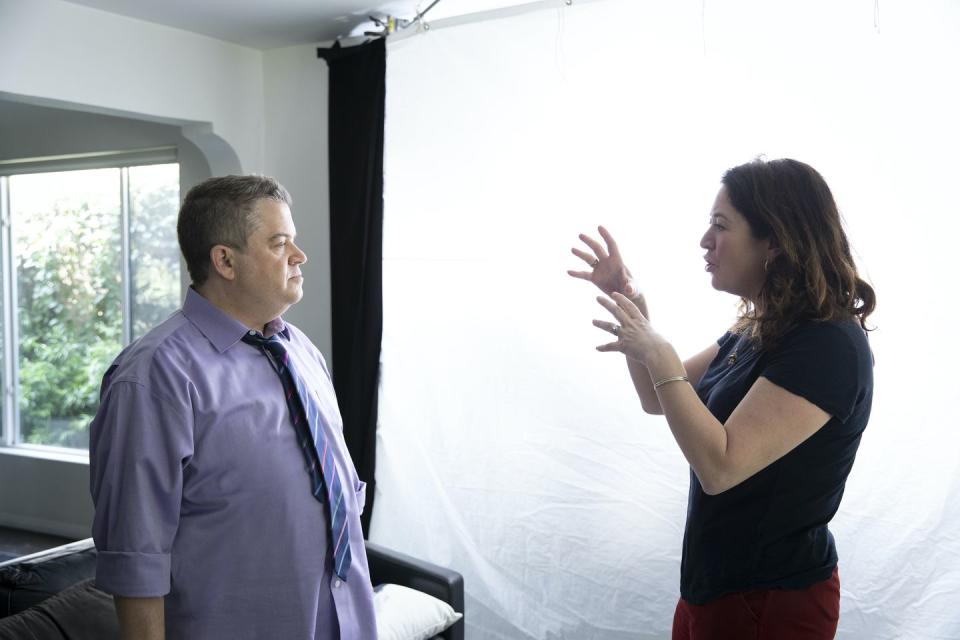Patton Oswalt and 'I'll Be Gone in the Dark' Director Liz Garbus Call Survivors Their 'North Star'

Late one April night in 2018, Patton Oswalt, Paul Haynes, and Billy Jensen had just finished up an event for I'll Be Gone in the Dark—the Michelle McNamara book detailing the horrific rape and murder spree of the Golden State Killer. In Chicago, just outside of McNamara's hometown, the event was bittersweet. McNamara suffered an accidental overdose with just about two-thirds of the book completed in 2016. Oswalt and a team took the lead, working to ensure his wife's book would be published, which eventually happened in February 2018.
In April of the same year, HBO had announced the book had been optioned for a miniseries. Oswalt and others were set to head to New York the day after the event when their phones started buzzing. Police had arrested Joseph James DeAngelo for the crimes McNamara had obsessively been investigating since 2012.
The development was colossal. For the first time in years, this was a step toward closure—not just for a six-year publication journey and a woman's four-year investigation, but for the 13 murder victims and 50 rape survivors that Joseph James DeAngelo was suspected of. The attacks, spanning more than a decade through the late '70s and '80s, first drew McNamara's attention when she pitched revisiting the killer's havoc to Los Angeles Magazine in 2013. The viral investigation gained national attention, eventually leading to the book—an instant true crime classic that combines the stories of survivors with McNamara's sensitive narrative voice. Now, the survivor-account driven book is premiering on HBO as a docuseries of the same name. Oswalt serves as executive producer.
Joining him on the journey is fellow executive producer and director, Liz Garbus, who helms the six-part series set to premiere on HBO, Sunday June 28. The story follows McNamara's thorough investigation of the East Area Rapist/Original Night Stalker, who she eventually dubbed "The Golden State Killer." Though police have been wary to give McNamara too much credit, her work helped to breathe new life into the investigation and her naming of the killer reinvigorated interest in the case.
Oswalt and Garbus spoke to Esquire over the phone about the day of DeAngelo's arrest, the inspiration for the docuseries, and how Michelle's work continues to live on.
This interview has been edited and condensed for clarity.
Michelle’s story and I’ll Be Gone in the Dark feels like such a special club that’s expanded and gotten so big. What do you think it is that makes this—I hate to use the word saga—so magnetizing for people?
Patton Oswalt: I mean, I'm just gonna guess it was the same reason as the initial way it drew Michelle [McNamara] in. It's such a massive series of crimes over decades, and it wasn't solved. How did this go unsolved for that long with that many crimes, that many victims, that much evidence? And then to have this person kind of resurrect it, partially through giving him a cooler name. That's a really weird thing to say, but even some of the cops acknowledged that. He was originally given these kind of bland “eh names,” and when she came up with Golden State Killer, they were like, “Oh, that actually helps focus interest,” and that's a terrible thing to admit. So there was just a lot of interesting factors in this.
I hate to ever call the true crime genre a piece of entertainment, but the way that you just phrased it is perfect. When you have a name like “the Zodiac Killer” or “the Golden State Killer,” all of a sudden the crimes seem almost more, forgive me for saying this, but marketable.
PO: I remember putting it that way one time to a homicide detective I was talking to and he was like, “I know it's uncomfortable for you to say that, but it's also true.” That is a factor in this, and that's a very squeamish thing to have to admit to as a policeman, but it's true. And it was weird. It was weird to even hear a cop admit to that. That that felt weird.
I know that filming started the day before The Golden State Killer was actually arrested. Do you guys remember what getting that information was like?
PO: Surreal. We had just done a book event in Chicago, in Michelle's hometown. We all went to sleep because we were going to New York the next day, and then suddenly everyone's cell phones start pinging and he had been captured, and we were like, what in the world is happening? How do we go on from here? It was a truly surreal moment. Not to be cliche, but surreal.

I can't imagine, because it definitely has to change the narrative entirely.
Liz Garbus: I would say it does and it doesn't. Of course it changes the narrative hugely for survivors, right? Like their narrative and having no longer to wonder, but I think for us as filmmakers, we still, like the journey we were going on was still the journey that Michelle went on in creating the book, before we knew anything about Joseph DeAngelo. We wanted this film to depict that journey.
Obviously it has a different ending, and in Episode Six, we get to speak to some of DeAngelo's family members, but at the end of the day there's no understanding that man. There's no rationalizing it. I mean, we can ask a lot of questions. Oh, think about the traumatic experiences that happened in his life to make him who he was? But it doesn't help anything. The search for justice and the resilience of the survivors is so much more interesting, you know? So it changes it and Episode Six is part of that. He's relevant because he's a monster and because it's important that the survivors can get justice, but he wasn't what we were focused on in that sense. The journey the survivors went through is so much more profound, I think, is what I'm trying to say.

Of course. One thing that's really carried over is that the focus of the documentary always stays on the survivors and tells their stories as authentically as possible. Was that something that was really important as you guys were moving this from something on the page to the screen that was in your mind?
LG: Definitely, and I think Michelle prioritized the survivors in her work. We never forgot that. In adapting her book for the screen, that was our North Star as well. We didn't want to fetishize this killer or build him up to be some superhero. He's just a loser, and the journeys that these survivors went through are so much more heroic. It was super important to us, and then of course Michelle’s writing about them, it was certainly a North Star for us.
What's special about the documentary is that it looks at how a writer can fit into a narrative, especially someone like Michelle who was so dogged about her work and getting to the bottom. How do you combine the stories of survivors with this woman and the incredible work Michelle did to compile it?
LG: We are interviewing the survivors about the worst experience of their lives. We are probing them, and then of course we are endeavoring along with their health to give us a 360 degree view of their journey and not reduce them to a soundbite. Michelle also was writing about herself. She was examining her relationship with her mother. She was examining the impossible balance of artistic pursuit, family, work and everything that every working parent feels. There were all of these intimate aspects to it.
What the point of filmmaking is, is to to hopefully reveal some truth and hopefully allow your readers or your viewers to connect. Those are all the points of connection that I felt, so those were the ones we wanted to bring out in the series.
PO: Liz just articulated it so much better than I could, so I'm gonna shut my mouth. That was perfect.
I'd forgotten how many people are really involved in putting this together. How does this village of people that brought this thing to life with Michelle factor in?
LG: For us it was instrumental. I mean Paul Haynes and Billy Jensen were instrumental in helping us gather materials, understand the case, reach out to law enforcement. You know, as Michelle would say, Michelle didn't work alone. She had such a community of fellow sleuths and the relationship that she built with law enforcement. It was a very collaborative endeavor she was engaged in. So for us to have them supporting us as helpers, researchers, consultants on this documentary was huge, and it also just felt like we were getting to know Michelle a little bit more by getting to work with those guys.
Patton, in putting this all together and getting a portrait of this work and this incredible journalist, what were you hoping most of all that this documentary would capture about the case and of course Michelle?
PO: Well, as far as the case is concerned, I really, really wanted it to capture the team effort, the resilience of the survivors and victims. I really was trusting Liz, and of course she came through with flying colors to rob the killer of that bullshit dark antihero power that a lot of crime narratives will give the killer. This one certainly is not the center of anything. He's just this lurking infection, basically. So those were my hopes and aims and Liz just surpassed them beyond anything I could've imagined.
You Might Also Like

